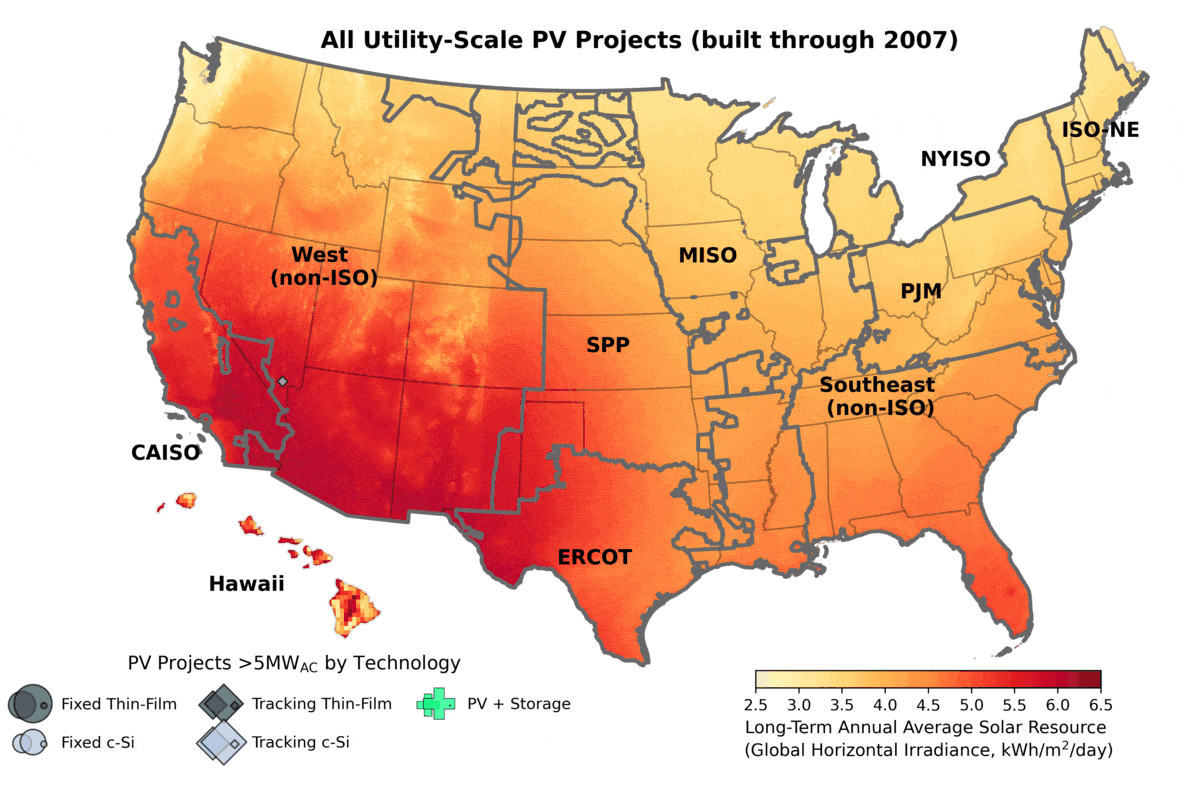From pv magazine USA
Lawrence Berkeley National Laboratory (LNBL) released its 2023 utility-scale solar report, reflecting on data collected through 2022. The report noted that utility-scale solar had a “strong” 2022 despite numerous challenges, installing 10.4 GW across the nation. This lagged the record 12.5 GW installed in 2021.
Cumulative utility-scale solar reached 61.7 GW nationwide by the end of 2022, said LNBL. Texas added the most last year, with 2.5 GW brought online, followed by California (2.1 GW), Virginia (0.6 GW), and Georgia (0.5 GW).
Single-axis tracking remained the most common configuration for the sector in 2022, with 94% of all new capacity added in 2022 using that mounting type. The remainder was mounted on a fixed tilt.
Installed costs of projects continued to fall in 2022, with median installed costs $1.32 per Wac. This occurred despite inflationary pressures throughout the year. Costs have now fallen by 78%, averaging about 10% per year, since 2010.
The levelized cost of electricity (LCOE) also fell in 2022, reaching an average of $39 per MWh. LNBL said the average LCOE has fallen about 84%, averaging 14% annually since 2010. This has been driven by lower capital costs and improving project capacity factors, among other factors, said LNBL.
Power purchase agreement (PPA) prices averaged $25 per MWh in 2022. Prices have largely followed the decline in LCOE over time, though prices stagnated and even increased in 2019.

Rising wholesale electricity prices have boosted the utility-scale solar national average market value by 40% in 2022, reaching $71 per MWh. Solar’s average market value in 2022 was lowest in CAISO ($51 per MWh) and highest in Duke Energy Florida’s service territory ($108 per MWh), said LNBL.
Hybrid projects that include battery energy storage are on the rise as well. In 2022, 35 projects totaling 3.6 GW of PV and 1.8 GW / 5.4 GWh of battery storage achieved commercial operations.
Looking ahead, massive amounts of utility-scale solar is queued up and waiting for interconnection approval across the United States. At least 947 GW of capacity was waiting in queues at the end of 2022. Almost half, about 457 GW, is paired with a battery.
While the Inflation Reduction Act has generated much excitement in the industry, the benefits have yet to be realized in this 2022 summary report, said LNBL.
“Nonetheless, 2023 is shaping up to be the strongest year on record for utility-scale solar, as the first eight months have already yielded 8.6 GW of capacity additions, which is 30% more than the prior record pace through August set in 2021,” said the report. “Based on EIA projections of capacity additions for September through December, total new utility-scale solar capacity added in 2023 could surpass 24 GW by the end of the year.”
The report’s authors will host a webinar to summarize key findings on Wednesday, October 18, 2023, at 10:00 a.m. PT/1:00 p.m. ET. Registration link here.
This content is protected by copyright and may not be reused. If you want to cooperate with us and would like to reuse some of our content, please contact: editors@pv-magazine.com.




1 comment
By submitting this form you agree to pv magazine using your data for the purposes of publishing your comment.
Your personal data will only be disclosed or otherwise transmitted to third parties for the purposes of spam filtering or if this is necessary for technical maintenance of the website. Any other transfer to third parties will not take place unless this is justified on the basis of applicable data protection regulations or if pv magazine is legally obliged to do so.
You may revoke this consent at any time with effect for the future, in which case your personal data will be deleted immediately. Otherwise, your data will be deleted if pv magazine has processed your request or the purpose of data storage is fulfilled.
Further information on data privacy can be found in our Data Protection Policy.